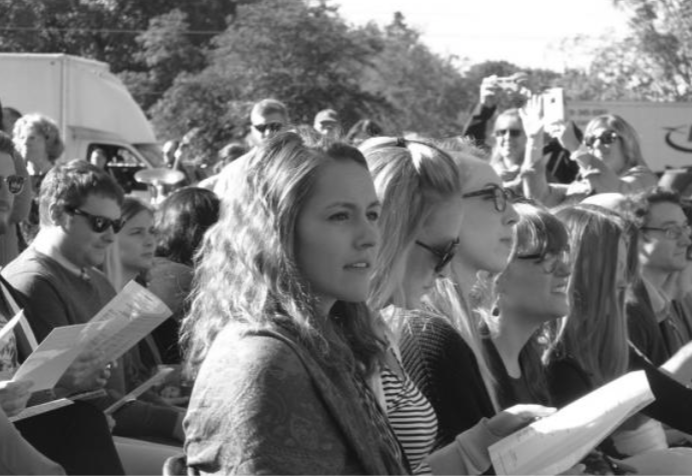By: Kate Rogers, Staff Writer
Professor James Napoli, retired journalist and adjunct faculty member, teaches just one class at USM: Intro to Journalism. As an aspiring journalist myself, this was the first class I signed up for. I wasn’t sure what to expect as a writer with no actual experience with news writing, but I got exactly what I needed out of Professor Napoli’s class. In fact, I told many people that it was the most useful class I had ever taken.
Not only is Napoli incredibly qualified to teach a journalism class, he is truly passionate about the profession. This genuine respect and excitement about his craft inspired and encouraged me. “I’ve worked for guys who practically thought of journalism as a church because it’s so valuable,” he said. “It’s an institution…that is vital to our country and our democracy.”
Journalism was not the original aspiration for Napoli. As a kid in Lawrence, Massachusetts, his only ambition was to get out of town. “I was stricken by my desire to travel at a very early age,” he said. “I would read Richard Halliburton’s Book of Marvels, that kind of thing.” Eventually, he found journalism as a way to fuel that desire.
At first, Napoli worked in the textile mills and in shoe shops. After college he taught at the same high school he had attended and then worked as a copy boy for the Boston Herald Traveler. Finally he applied for a job as a reporter at the Providence Journal in Rhode Island. This was the beginning of his career as a journalist. “It was easier in those days actually than it is now,” he said about getting his job. “I had no journalism training or anything like that. If you could write and you were reasonably alert you could get a job in journalism.”
Napoli went on to do many incredible things with his passion and his ability. Not only did he write for many papers and magazines, but he spent nine years working as an analyst for the CIA and was the chairman of the journalism department at the American University in Cairo, Egypt. During this time in Cairo he was doing freelance journalism for newspapers in America and was the Cairo correspondent for the Washington Report on Middle Eastern Affairs. He said that time was one of the best eras of his life.
I somewhat selfishly asked Professor Napoli in our interview if he thought he’d made a difference in the world with journalism. He first cited some of his work in the warzone in Iraq, which he could not give details on but said that yes, he felt like he did have an impact. What really rang true to me though was in the way he later defined journalism. “You have an audience and you’re trying to write as truthfully as you can…for them to make decisions about the world,” he said.
Journalism is important because it is a key component of freedom. Without journalism people would be uninformed about their world. You do not have a say in your governments or communities or even truly your lives if you don’t have information. In today’s media environment it is more imperative than ever that there are unbiased, brave journalists. Journalists who, as Napoli said “Are trying to keep things steady and trying to report the world the way it really is, and not the way you’d like it to be.”
The most important advice that Professor Napoli left me with is that journalism is not going to be easy. “I can’t begin to tell you the number of nights I woke up in the middle of the night in a cold sweat worrying about something I had written, or whether I’d made a mistake..all the time,” he said. “But if it isn’t hard then you’re not doing it right.”
You should hope to worry about mistakes in your writing. Being concerned about people getting the wrong information is the essence of journalism. It is your job to inform them correctly. Understanding the consequences of not doing that so completely that it keeps you up at night is an inspirational level of commitment to the institution of journalism.
And it is worth it when you get it right. “It feels good when you get out there and report something of value,” Napoli said. Even if you don’t report on something that feels big or world-changing, remember that it is the small things that make a big difference.

